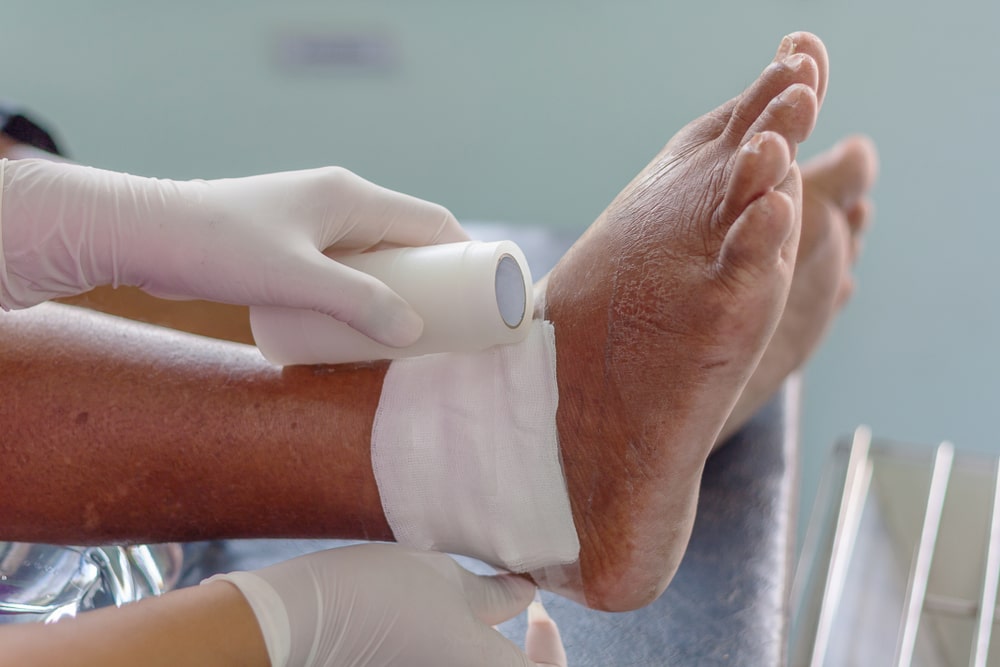
Diabetic patients are at high risk of developing sores and ulcers on the feet, ankles, and lower legs that are difficult to treat. Without proper care, a tiny cut or broken blister can grow into an open wound that may lead to serious infection, gangrene, and even amputation. Awareness of the danger is the first step to preventing such complications, but equally important is finding a medical provider with the knowledge and skill to effectively treat chronic wounds.
Diabetes contributes to the formation of ulcers for several reasons. The high blood sugar levels that characterize diabetes can damage your nerves and blood vessels over time, especially when those levels are poorly controlled. Diabetes is also linked to a condition known as peripheral artery disease (PAD), which diminishes blood flow to the legs and feet.

Lowered blood flow to your extremities impedes your body’s ability to heal sores and cuts and to fight off infections. On top of that, diabetic nerve damage makes it harder to feel when you’ve gotten a minor injury like a nick or scrape, increasing the odds that you’ll overlook a small wound until it has become larger, infected, and harder to treat.
The good news is that proper diabetes management and wound care can greatly reduce the chances that an unremarkable injury will lead to a below-the-knee amputation. However, vigilance and prompt, expert treatment is vital in preserving your limb. When nonhealing ulcers progress to the point of causing severe damage to tissues and bones, surgical removal of the affected area may be the only option.
If you have a diabetic foot, ankle, or leg wound, you should immediately consult a podiatrist with expertise in wound care. At Corona Foot and Ankle, we strongly urge our patients to come in even if they think an injury is too small to be a serious concern—proactive treatment can help identify underlying issues and prevent bigger problems.
When we’ve done a comprehensive exam to ensure we understand all the factors involved, we devise a care plan to promote healing while guarding against infection. Treating the cause of the wound rather than just the symptoms is essential for success. Your plan can include:
In addition to these direct wound care steps, we’ll also work on other factors that can exacerbate the wound or slow healing. Taking pressure off the wound as it heals, through special footwear or assistive devices like crutches, will help speed recovery. In addition, keeping your blood sugar under control will improve your body’s ability to heal your ulcer. The exact details of your treatment plan will depend on the location and severity of your wound and the individual circumstances of your overall health.
The worst complications of diabetic wounds can often be avoided with an ongoing program of prevention and monitoring under the care of a specialist like Dr. Amin. However, in more complex situations, Dr. Amin and the team at Corona Foot and Ankle are also highly skilled in using advanced techniques to preserve your limb from amputation. We take every measure possible to keep your limb healthy and uphold your long-term quality of life.
For patients with diabetes, regular foot care is key to maintaining your overall health. When you have a diabetic foot ulcer that simply won’t heal on its own, Corona Foot and Ankle can help. We’re the leading wound care center in the Inland Empire, pairing a holistic approach with cutting-edge healing techniques to achieve the best possible outcomes for our patients. Through prevention, education, and treatment, we work to keep your feet healthy so you can enjoy the activities you love. To find out more about how we can help heal your chronic diabetic wounds, contact us here.
Have any questions about treatment? Feel free to make an appointment, Our team will reach you soon!
Contact Us